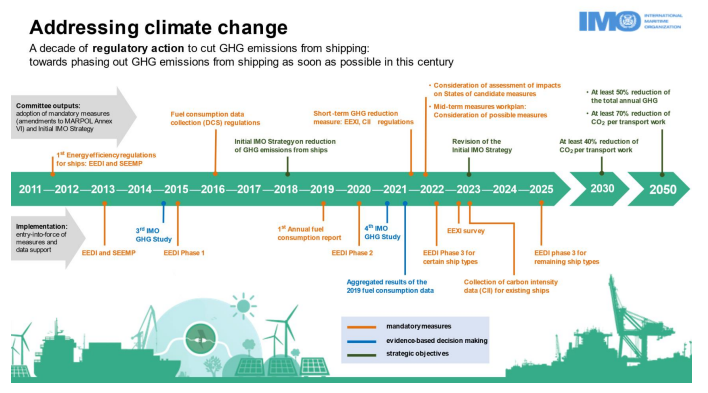IMO has updated the United Nations Bonn Climate Change Conference (5-15 June) on its work towards adopting a revised Strategy to reduce GHG emissions from shipping.
The upgraded strategy is set to be adopted at the IMO Marine Environment Protection Committee (MEPC 80), which meets 3-7 July following a meeting of the Intersessional GHG Working Group (26-30 June).
According to the submission, IMO is accelerating its efforts to decarbonize the shipping sector as soon as possible, through important parallel tracks, inter alia:
- Finalization of a revised Strategy with strengthened ambition for adoption by MEPC 80 in July 2023
- Development of a basket of mid-term GHG reduction measures, including technical and economic elements, to pursue further GHG reduction whilst maintaining a level playing field and ensuring that no one is left behind
- Finalization of new guidelines on the life cycle GHG intensity of marine fuels to encourage the production, supply and use of sustainable low-carbon and zero-carbon marine fuels in the near future
- Development of the necessary safety regulatory framework allowing safe handling of the future marine fuels on board of ships
- Scaling up of technical cooperation and capacity-building initiatives to support shipping decarbonization in developing countries, in particular Small Island Developing States and Least Developed Countries, to ensure a just and equitable transition to low-carbon shipping and seize development opportunities arising from the decarbonization of the sector.
 The submission also includes a briefing of emission reduction strategies discussed and implemented during Marine Environment Protection Committees. It also presents other IMO partnerships and initiatives that promote sustainability and green shipping.
The submission also includes a briefing of emission reduction strategies discussed and implemented during Marine Environment Protection Committees. It also presents other IMO partnerships and initiatives that promote sustainability and green shipping.
In a statement to the UNFCCC Subsidiary Body and for Scientific and Technological Advice (SBSTA), IMO’s Camille Bourgeon highlighted the mandatory energy efficiency regulations already adopted by IMO and ongoing work to ensure that international shipping bears its fair share of responsibility in addressing climate change.































































